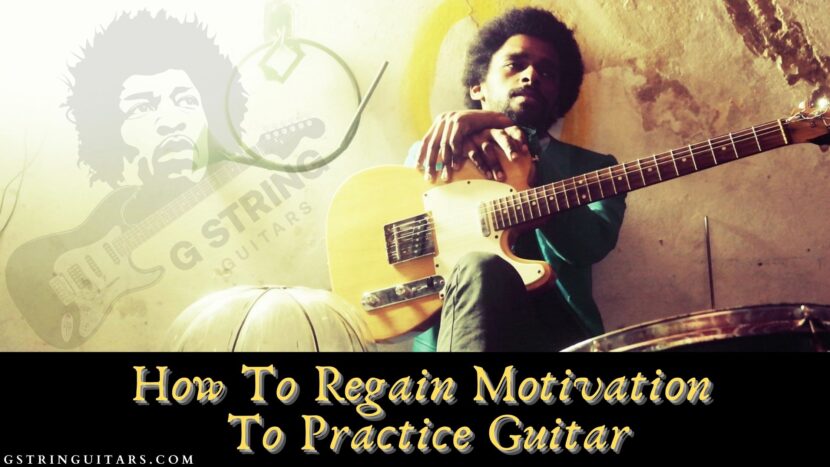Struggling to Pick up your Guitar? Discover Effective Tips and Strategies to Regain Motivation to Practice Guitar and Reignite your Passion for Playing.
This Post May Contain Affiliate Links
In compliance with the FTC guidelines, please assume that some of the links on these posts and sites are affiliate links (Amazon or others) from which I may earn a small compensation/commission from sales of certain items at no extra cost to you from qualifying purchases.
Anytime you see a link that looks like “astore.com, paid link, #ad, #CommissionsEarned or Amazon/Amazon.com/ca,”… it can be assumed that it is an affiliate link.
To learn more, follow the link below.
How To Regain Motivation To Practice Guitar
Regardless of your level of expertise, every guitarist encounters periods of diminished Motivation.
Whether you’re a beginner or a seasoned player, it’s normal to sometimes feel uninspired or stuck in a rut. This can leave you with questions about whether you should continue playing guitar.
The key is not to let these phases temporarily or permanently derail your musical journey.
Most great musicians do not possess an unusually high level of Motivation. However, they have a work ethic or discipline that results from years of constant showing up and putting in the effort through up and down cycles of Motivation.
There is nothing wrong with you if you don’t always feel motivated. That’s perfectly normal. Everybody feels down from time to time, even people that we call guitar heroes. There are no exceptions.
This post will explore practical strategies for regaining Motivation to practice guitar, reigniting your passion, and keeping on.
Understand Why You Left To Begin With
 Whether you are lagging in mojo temporarily or have stopped playing for a short period or a more extended hiatus.
Whether you are lagging in mojo temporarily or have stopped playing for a short period or a more extended hiatus.
Before you can effectively get back into playing your electric guitar consistently, it’s essential to understand the reasons behind your break or hiatus.
The good news is that with the right approach, you can rekindle your passion for playing and make this reunion a joyful and fulfilling experience.
Some common issues that could cause you to no longer enjoy playing guitar…
External Life Events
Life events such as career/family responsibilities or changes, all of which can disrupt or lead to a prolonged break.
Because of the inevitable interruptions in your life, it can be hard to get back into practicing guitar regularly.
Recognize that breaks are sometimes unavoidable and do not reflect your commitment to music, and it’s okay to prioritize other aspects of your life when necessary.
Addressing these reasons can provide valuable insights and help you develop a more sustainable and enjoyable approach to future practice and playing.
Burnout
Was it a particular music guitar genre, a favourite guitarist, learning a specific song or eventually performing onstage?
Reconnecting with your initial or new motivations can provide a strong foundation for your renewed commitment.
Revisit those sources of inspiration, or find new ones to reignite your passions.
Self Awareness
By understanding and addressing the reasons for your lack of Motivation while taking a break from playing, you can approach your return with a fresh perspective and a more sustainable plan.
This self-awareness will help you create a practice routine that is enjoyable, balanced, and tailored to your needs, ultimately ensuring that you continue to grow.
Understanding Motivation
What is Motivation, and is it enough to carry us through this next evolution of renewed guitaring?
It’s important to note that players can experience both types of Motivation at different times and intensity levels in their musical journeys.
Motivation Works In Waves

There are times when we are “highly” motivated to perform, but there are also “down” cycles when we lack this same desire to push forward, and digging ourselves out of a down cycle can be challenging.
Motivation comes in waves at different times.
If you take guitar seriously, motivating yourself to practice is not an excellent long-term strategy; sometimes, we can’t make ourselves do things we planned to do.
It would be best to utilize Motivation when it is present, but you must also plan for times when you don’t “feel it” and are at a low point.
Developing A Long-Term Strategy
Build Rituals & Habits
A ritual is a series of actions performed according to a prescribed order. When Motivation is lacking, a ritual can help you through downtime and keep you consistent.
The 5-Minute Ritual
On the days when you don’t feel like practicing guitar, set a ritual of picking up your instrument for 5 minutes.
Promise yourself that if you don’t like continuing to practice after 5 minutes, you can put the guitar down for the day.
Nine times out of ten, the 5 minutes you have set for yourself will have gone by without you noticing it, and before you know it, you will become so engaged in the process that you end up practicing guitar for at least 20-30 minutes before you look at the clock again.
Sometimes, “getting started” is the most challenging part of the process.
Habits
A habit will form from these consistent rituals and reinforce your behaviours to maintain your skills.
If you are serious about playing guitar, accept that you will practice for the rest of your life, so don’t try to do it all at once.
Don’t worry about the playing volume when re-approaching the instrument; play daily until it feels like second nature, and you feel like you are “missing something” if you do not practice.
Set a manageable practice schedule (e.g., 30 minutes/day) and gradually increase the duration and intensity of your sessions to help prevent overwhelm.
Consistency
Forming a habit requires more energy and consistency in the beginning. Still, after the habit is built, you start doing those behaviours on auto-pilot, like brushing your teeth.
The best thing is that once the habit is formed, through consistency, you can slowly modify your routine to fit your goals, but do not try to change everything at once.
Stay Focused
Take Breaks

Find Balance
When resuming a practice routine, strive to find balance.
Create a schedule that accommodates your renewed guitar commitments without causing stress to your daily non-musical responsibilities.
Playing the guitar can be a therapeutic outlet for coping with life’s challenges. Use your practice time to unwind, not add stress to your already busy life.
Keep It Interesting
Explore new genres, techniques, or songs you haven’t tried before.
Variety can make practice sessions more engaging and enjoyable.
Sometimes, a lack of Motivation stems from a stale practice routine.
- If you have been spending too much time practicing guitar technique, move it down on your priority list for a while and instead focus on other skills such as music theory, ear training, or improvising.
You’ll find practice sessions more enjoyable, interesting and stimulating by injecting variety into your routine.
Setting Goals

Long Term
Keeping your mind focused on the long-term goals that you want to achieve is essential for direction and clarity.
Then, breaking down your long-term aspirations into smaller, manageable milestones and working backwards daily helps you achieve that long-term vision and gives you a purpose.
Short Term
Short-term goals generally take less time to complete, which allows you to feel a sense of accomplishment sooner and more often.
Having these smaller, achievable targets helps you track your progress and provides a sense of accomplishment, which fuels your Motivation to keep practicing.
Clear short-term goals give you something concrete to work towards and provide a sense of direction.
The critical thing to remember is that you will need both long-term and short-term goals to achieve any personal or professional vision.
Support Learning
Guitar Lessons
Consider taking lessons to learn new techniques or improve existing ones, online or in person.
There are countless resources available, from video tutorials to interactive courses.
Engaging with new material can provide fresh inspiration and keep your practice sessions interesting.
Don’t hesitate to seek guidance from a guitar teacher or mentor who can provide personalized tips and support.
Learning Songs
You can also challenge yourself to focus your practice on learning a particular piece of music you have wanted to play for a very long time.
Doing this will allow you to keep moving toward your guitar-playing goals while giving your mind a break from the same old practice routine, not to mention developing your “musical ear.”
Such an approach will also often lead you to discover new ideas you wouldn’t have otherwise considered that can be added to your regular practice sessions and playing.
Music Communities
Join guitar forums, social media groups, or local jam sessions to connect with fellow musicians.
Sharing your progress, asking for advice, and supporting others can create a sense of community, keep you engaged with your instrument, and reignite your passions.
Collaborating with others can push you to improve, offer new perspectives, and make the experience of playing guitar more social and enjoyable.
Live Performances
Watch live performances; inspiration often comes from seeing others excel in live environments.
Surround yourself with live music that excites you, and look to other musicians for Motivation.
Record Yourself
Recording is tricky and is a skill in itself.
You can be good at playing but bad at recording.
Every recording session becomes an opportunity to improve your playing, with the recording session acting as your final reward.
If you record poorly, use your shortcomings as an opportunity to learn more and give your Motivation a clear target.
Video
Final Thoughts
Rekindle Passion

Whether life got in the way or you lost touch with your musical side, picking up the guitar again is a journey worth taking.
Getting back with your electric guitar after a break can be a rewarding experience that reignites your passion for music.
Understand that this progress can be slow but steady.
Celebrate small improvements and stay patient/persistent.
To become great at anything, you must have personal discipline, a good work ethic, habits/rituals, focus, consistency, etc., and a vision.
Playing and practicing guitar is a privilege and a valued skill set that can be leveraged into all other areas of life, both personally and professionally.
By implementing the strategies in this post, you’ll rediscover the joy and excitement that initially drew you to the guitar, but never forget to embrace the journey and, most importantly, have fun!
Did you Like this Post?
Check out the post on using 10 Veteran Concepts To Improve Guitar Playing
Also…
Please leave your comments in the section below, and if you have a favourite player, guitar or topic you would like me to publish an article on, leave a note below.
Stay the course, keep playing and see you in a few weeks.
Feature Image courtesy of Elzo HENSCHELL from Pixabay
All Ai Generated Images courtesy of bing.com

Starting A Journey At 7 Years Of Age, The Love For The Guitar Only Became Stronger Going Into My Teens. This Leading To An Exciting Time Of Teaching, Performing, And Recording. Join Me Now As We Can Bring The Love Of This Instrument To Other Musicians Globally.







